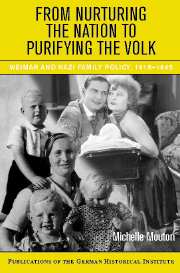Book contents
- Frontmatter
- Contents
- Acknowledgments
- List of Abbreviations
- Introduction
- 1 Marriage Policy in Turmoil
- 2 Divorce
- 3 From Mother's Day to Forced Sterilization
- 4 Alleviating the Burdens of Motherhood
- 5 Maternal Morality versus Infant Mortality
- 6 Forming Families beyond Blood Ties
- 7 Conclusion
- Bibliography
- Index
5 - Maternal Morality versus Infant Mortality
Negotiating Policy toward Single Mothers and Their Children
Published online by Cambridge University Press: 05 January 2013
- Frontmatter
- Contents
- Acknowledgments
- List of Abbreviations
- Introduction
- 1 Marriage Policy in Turmoil
- 2 Divorce
- 3 From Mother's Day to Forced Sterilization
- 4 Alleviating the Burdens of Motherhood
- 5 Maternal Morality versus Infant Mortality
- 6 Forming Families beyond Blood Ties
- 7 Conclusion
- Bibliography
- Index
Summary
Lina E. was employed as a maid when she became pregnant in 1922 at the age of twenty-three. One month before she gave birth to her daughter, Martha, she quit her job and moved in with her parents. When her lover, August K., denied paternity and refused to pay child support, Lina and Martha's case became embroiled in a complex system of legal and social policies governing illegitimacy and single motherhood. During the fifteen years of Lina's involvement with the courts and child welfare agencies, children born outside of marriage and their mothers were at the center of debate at the national level, and policy implementation underwent substantial change at the local level.
For Weimar politicians, single mothers represented a breach of traditional morality, while their children promised to ameliorate the falling birthrate. Repeatedly, Weimar policymakers asked: How could the state admonish single mothers without hurting their children – or, inversely, how could it help illegitimate children without condoning the behavior of their unmarried mothers? What would deter childbirth outside of marriage if the state removed the stigma of single motherhood? The high infant mortality rates after the First World War prompted all politicians to agree with the general goal of improving the health and well-being of illegitimate children. Given the financial cost of raising a child, however, few wanted the state to shoulder the burden. Most believed fathers should support their illegitimate children. But what if paternity could not be proven?
- Type
- Chapter
- Information
- From Nurturing the Nation to Purifying the VolkWeimar and Nazi Family Policy, 1918–1945, pp. 197 - 235Publisher: Cambridge University PressPrint publication year: 2007



